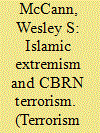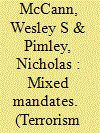|
|
|
Sort Order |
|
|
|
Items / Page
|
|
|
|
|
|
|
| Srl | Item |
| 1 |
ID:
188032


|
|
|
|
|
| Summary/Abstract |
The distinction between hate crime and terrorism is a contentious legal issue that impacts how respective crimes are labeled and prosecuted. Using a legal content analysis, this study examines what central legal elements comprise hate crimes and terrorism, respectively, for each state to discern their legal differences. The analysis along with exegesis of terrorism and hate crime definitions enumerated in state law demonstrates that these crimes are too similar to be different legal constructs, given their definitional elements and real-world applications. The study concludes that these “crimes” need to either be eliminated from criminal law or altered so as to make the adjudication of so-called extremism more parsimonious, equitable, and consistent. Recommendations are proffered on how this can be accomplished.
|
|
|
|
|
|
|
|
|
|
|
|
|
|
|
|
| 2 |
ID:
191003


|
|
|
|
|
| Summary/Abstract |
The extant literature on the relationship between religious ideology and CBRN weapons pursuit lacks a strong empirical basis. To address this, the current study utilizes a new dataset—the CBRN Terrorism Database (CTD)—to evaluate whether Islamic actors are more or less likely to pursue CBRN weapons. Binary logistic regression models are used on several different constrained subsamples to assess the relationship between ideology, group-, and country-level factors and CBRN weapons pursuit. Across the models, the strongest predictors of pursuit are whether the actor is an individual, is inspired by an Islamic ideology, and resides in a country with low levels of ethnic fractionalization. Other factors are important under specific contexts, but Islamic groups are significantly more likely to pursue CBRN weapons as well. Implications and recommendations are discussed.
|
|
|
|
|
|
|
|
|
|
|
|
|
|
|
|
| 3 |
ID:
172201


|
|
|
|
|
| Summary/Abstract |
Defining terrorism continues to be a problematic task for scholars, politicians, and government officials. Research has shown that developing a single definition of terrorism is not only unlikely, but also quite difficult. Definitions of terrorism can arguably be influenced by cultural, social, and political factors. This study qualitatively examines state criminal law and federal organizational definitions of terrorism to discern what elements are commonly seen across such definitions. Furthermore, this article examines what issues arise due to the differences and similarities between and across these groups of definitions. This study finds that organizational definitions are seemingly tied to institution mission or mandate, whereas state definitions are sporadic, lacking consensus, and are evidently influenced by major events such as the September 11 attacks. Across organizational and state definitions of terrorism, “violence,” “fear, terror,” and “target” were the most common elements included. However, other definitional elements exhibited different trends when comparing organizational and state definitions of terrorism. Overall, defining terrorism will continue to be a problem in all arenas as long as the definition is allowed to change due to external factors or influences.
|
|
|
|
|
|
|
|
|
|
|
|
|
|
|
|
| 4 |
ID:
191482


|
|
|
|
|
| Summary/Abstract |
This article examines the reliability of “terrorism” classifications within the Global Terrorism Database (GTD) by looking at its inclusion criteria as well as filtering mechanisms for ensuring quality case inclusion. Using several descriptive analyses, this article examines how various measures within the GTD affect researcher’s ability to adequately analyze various patterns or trends of offending. The underlying limitations of the data, namely data inclusion, the defining of terrorism, and inconsistency in labeling events are examined. It is concluded from the analyses that what is being defined as terrorism matters downstream when examining the data, given that it is used to make inferences about groups, movements, or the efficacy of governmental policy. Since scholars often lack a proper “error” framework for assessing the quality of big data derived from open sources on terrorism, it makes it difficult for scholars to assess the quality of the data itself. As a result, researchers are encouraged to include an error framework within the GTD for academics to assess the quality of the data they are plugging into their models. Results, limitations, and recommendations are further expanded upon within.
|
|
|
|
|
|
|
|
|
|
|
|
|
|
|
|
|
|
|
|
|